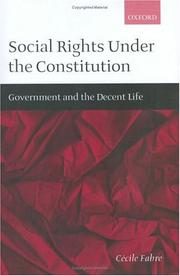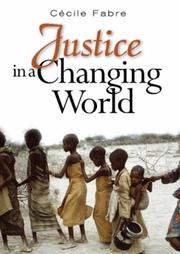| Listing 1 - 10 of 15 | << page >> |
Sort by
|
Book
ISBN: 9780199567164 0199567166 0191746053 0198708572 9786613922144 0191662712 128360969X 9780191662713 9781283609692 9780191746055 9780198708575 Year: 2012 Publisher: Oxford: Oxford university press,
Abstract | Keywords | Export | Availability | Bookmark
 Loading...
Loading...Choose an application
- Reference Manager
- EndNote
- RefWorks (Direct export to RefWorks)
War is about individuals maiming and killing each other, and yet, it seems that it is also irreducibly collective, as it is fought by groups of people and more often than not for the sake of communal values such as territorial integrity and national self-determination. Cecile Fabre articulates and defends an ethical account of war in which the individual, as a moral and rational agent, is the fundamental focus for concern and respect--both as a combatant whose acts of killing need justifying and as a non-combatant whose suffering also needs justifying. She takes as her starting point a political morality to which the individual, rather than the nation-state, is central, namely cosmopolitanism. According to cosmopolitanism, individuals all matter equally, irrespective of their membership in this or that political community. Traditional war ethics already accepts this principle, since it holds that unarmed civilians are illegitimate targets even though they belong to the enemy community. However, although the traditional account of whom we may kill in wars is broadly faithful to that principle, the traditional account of why we may kill and of who may kill is not. Cosmopolitan theorists, for their part, do not address the ethical issues raised by war in any depth. Fabre's Cosmopolitan War seeks to fill this gap, and defends its account of just and unjust wars by addressing the ethics of different kinds of war: wars of national defence, wars over scarce resources, civil wars, humanitarian intervention, wars involving private military forces, and asymmetrical wars.
War --- Cosmopolitanism --- War (Philosophy) --- Philosophy --- Political science --- Internationalism --- Cosmopolitanism.
Book
ISBN: 9780198786245 0198786247 Year: 2016 Publisher: Oxford: Oxford university press,
Abstract | Keywords | Export | Availability | Bookmark
 Loading...
Loading...Choose an application
- Reference Manager
- EndNote
- RefWorks (Direct export to RefWorks)
This book articulates a cosmopolitan theory of the principles which ought to regulate belligerents' conduct in the aftermath of war. Throughout, it relies on the fundamental principle that all human beings, wherever they reside, have rights to the freedoms and resources which they need to lead a flourishing life, and that national and political borders are largely irrelevant to the conferral of those rights. With that principle in hand, the book provides a normative defence of restitutive and reparative justice, the punishment of war criminals, the resort to transitional foreign administration as a means to govern war-torn territories, and the deployment of peacekeeping and occupation forces. It also outlines various reconciliatory and commemorative practices which might facilitate the emergence of trust amongst enemies and thereby improve prospects for peace. The book offers analytical arguments and normative conclusions, with many historical and/or contemporary examples.

ISBN: 9780199532292 9780199289998 0199289999 0191603554 019953229X 9786611154721 0191537314 1281154725 1435624025 9780191537318 Year: 2008 Publisher: Oxford Clarendon Press
Abstract | Keywords | Export | Availability | Bookmark
 Loading...
Loading...Choose an application
- Reference Manager
- EndNote
- RefWorks (Direct export to RefWorks)
In the prevailing liberal ethos, if there is one thing that is beyond the reach of others, it is our body in particular, and our person in general: our legal and political tradition is such that we have the right to deny others access to our person and body, even though doing so would harm those who need personal services from us, or body parts. However, we lack the right to use ourselves as we wish in order to raise income, even though we do not necessarily harm others by doingso---even though we might in fact benefit them by doing so. C--eacute--;cile Fabre's aim in this book is to show that, according to the principles of distributive justice which inform most liberal democracies, both in practice and in theory, it should be exactly the other way around: that is, if it is true that we lack the right to withhold access to material resources from those who need them, we also lack the right to withhold access to our body from those who need it; but we do, under some circumstances, have the right to decide how to use it in orderto raise income. More specifically, she argues in favour of the confiscation of body parts and personal services, as well as of the commercialization of organs, sex, and reproductive capacities.
Status of persons --- Human rights --- Professional ethics. Deontology --- Legal theory and methods. Philosophy of law --- Surrogate mothers --- Gestational mothers --- Host mothers --- Uterine mothers --- Good Samaritan laws --- Assistance in emergencies. --- Personality (Law). --- Assistance in emergencies --- Human body --- Personality (Law) --- Transplantation of organs, tissues, etc --- Medical laws and legislation --- Mothers --- Law and legislation --- Legal status, laws, etc --- Body, Human --- Law and legislation. --- Legal status, laws, etc.

ISBN: 0198296754 9780198296751 Year: 2000 Publisher: Oxford: Clarendon,
Abstract | Keywords | Export | Availability | Bookmark
 Loading...
Loading...Choose an application
- Reference Manager
- EndNote
- RefWorks (Direct export to RefWorks)
Democracy. --- Social justice. --- Equality --- Justice --- Self-government --- Political science --- Representative government and representation --- Republics --- Democracy --- Social justice
Book
ISBN: 1281970867 9786611970864 0191522767 058535264X Year: 2000 Publisher: Oxford : New York : Clarendon Press ; Oxford University Press,
Abstract | Keywords | Export | Availability | Bookmark
 Loading...
Loading...Choose an application
- Reference Manager
- EndNote
- RefWorks (Direct export to RefWorks)
Those in favour of social rights do not usually reflect on the implications of their arguments for democracy and vice versa. This book illustrates the conflict between the demands of democracy and those of social rights.
Democracy. --- Social justice. --- Equality --- Justice --- Self-government --- Political science --- Representative government and representation --- Republics
Book
ISBN: 9780674988866 0674988868 9780674979635 067497963X Year: 2018 Publisher: Cambridge (Mass.): Harvard university press,
Abstract | Keywords | Export | Availability | Bookmark
 Loading...
Loading...Choose an application
- Reference Manager
- EndNote
- RefWorks (Direct export to RefWorks)
Leaders have used economic power as a tool of foreign policy since at least Pericles, whose trade sanctions against Megara helped to spark the Peloponnesian War. But as Cécile Fabre notes, philosophers have spent relatively little time thinking about the relevant ethics, especially compared with the time they have spent thinking about the ethics of war. Yet the moral questions raised by the use of economic statecraft are significant and complex. Fabre deploys a cosmopolitan theory of justice and the theory of justified harm to answer these questions, and concludes that political actors are morally entitled to resort to economic sanctions and conditional aid, but only as a means to protect human rights, and so long as the harms which they thereby inflict are not out of proportion to the goods they bring about. Moreover, they are morally entitled to resort to conditional lending and conditional debt forgiveness, not just with a view to protect human rights, but also, under certain conditions, to pursue other non-wrongful political goals.--
E-books --- Economic sanctions --- Economic assistance --- Conditionality (International relations) --- Human rights

ISBN: 9780745639703 Year: 2007 Publisher: Cambridge : Polity press,
Abstract | Keywords | Export | Availability | Bookmark
 Loading...
Loading...Choose an application
- Reference Manager
- EndNote
- RefWorks (Direct export to RefWorks)
Book
ISBN: 0674988841 0674988868 Year: 2018 Publisher: Cambridge, MA : Harvard University Press,
Abstract | Keywords | Export | Availability | Bookmark
 Loading...
Loading...Choose an application
- Reference Manager
- EndNote
- RefWorks (Direct export to RefWorks)
Economic sanctions provide an alternative to waging war or a means to advance human rights. But are they morally justifiable? Philosophers have explored the ethics of war but rarely the ethics of carrots and sticks. Cécile Fabre offers a defense of economic statecraft, laying out a normative framework for this critical tool of diplomacy.
Human rights --- Economic sanctions --- Economic assistance --- Conditionality (International relations) --- Economic aspects. --- Moral and ethical aspects.
Book
ISBN: 9780199682836 0199682836 0191763012 0191505315 9780191505317 9780191763014 0191022705 Year: 2014 Publisher: Oxford Oxford University Press
Abstract | Keywords | Export | Availability | Bookmark
 Loading...
Loading...Choose an application
- Reference Manager
- EndNote
- RefWorks (Direct export to RefWorks)
International law and conventional morality grant that states may stand ready to defend their borders with lethal force. But what grounds the permission to kill for the sake of political sovereignty and territorial integrity? In this book leading theorists address this vexed issue, and set the terms of future debate over national defence.
Social ethics --- Political philosophy. Social philosophy --- Polemology --- War (Philosophy) --- War --- War and morals --- Philosophy --- Moral and ethical aspects. --- PhilosophyMoral and ethical aspects. --- Moral and ethical aspects
Book
ISBN: 2225829535 Year: 1998 Publisher: Paris : Paris : G. Masson, InterEditions,
Abstract | Keywords | Export | Availability | Bookmark
 Loading...
Loading...Choose an application
- Reference Manager
- EndNote
- RefWorks (Direct export to RefWorks)
| Listing 1 - 10 of 15 | << page >> |
Sort by
|

 Search
Search Feedback
Feedback About UniCat
About UniCat  Help
Help News
News